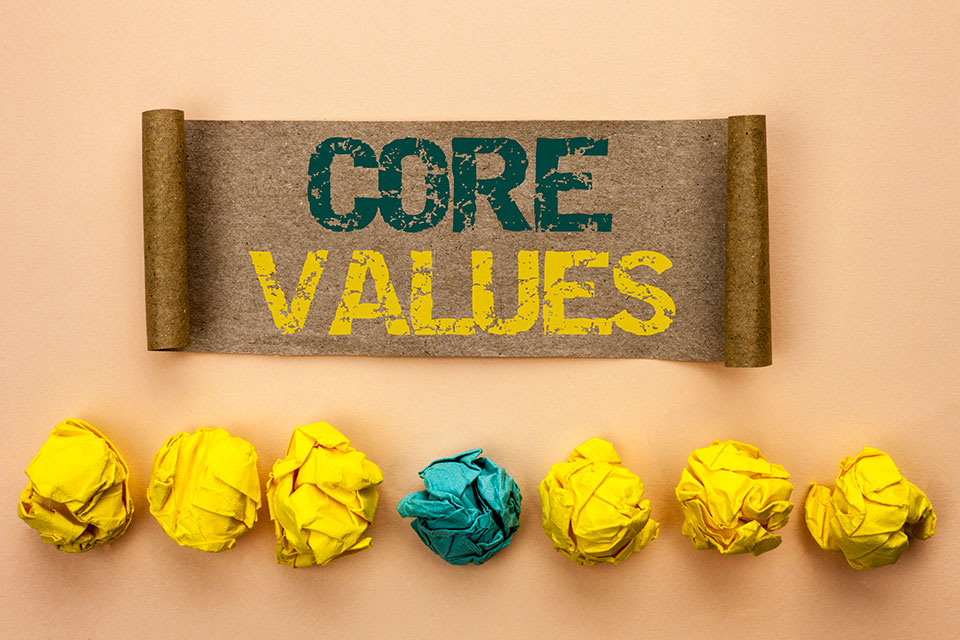Understanding The Five Types of Values

Training people swiftly with business values is becoming more important towards overall success. Studies from Nielsen and Engage for good highlight companies’ values and social responsibility are a core consideration for both customers and employees: especially millennials (over 70%) who use it amongst criteria when electing who to work for.
There are two questions worth considering :
- How do we embed values during onboarding?
- How can we drive values with more consistency?
As many who work in learning, development, training or HR will appreciate values are an important component of any induction. Planting strong seeds early is essential.
A key shift in learning in the last couple of decades has been an increased move towards individual learning pathways. The same principle applies here.
And when you can wrap you head around the five core elements of values and value perception, you can tailor onboarding and individual learning pathways accordingly.
The five value elements
1) Personal value is the essence of why individual learning has so much merit. The manner people learn, their strengths, their Achilles heels, their motivation and personal circumstances play a significant component to their interpretation and application of any ideologies you wish to see espoused.
Take time to ask questions (a skill in both sales and coaching!) of what’s truly important to each individual. Once you know their motivations and goals you can adapt language, even rewards, for alignment. Profiling tools (DISC, MBTI etc) may be exceptionally handy as a component, but by no means necessary.
2) Tangible value is the value language of business! Every leader has days of joy, or sometimes stress, digesting spreadsheets of results. And every leader in the world knows, even subconsciously, there are only four tangible value metrics to be across.
Often though we get so focused on the results we need to see we forget to realise or translate this into what’s more important to the individual. A classic example is the misnomer that all sales people are only interested in money.
Dollars, percentages, numbers and time
Is the tangible value nursery rhyme,
But the metrics that matter are yours, not mine!
When using reports, learn to ask better questions and figure out which metrics are simultaneously important to each team member.
3) Emotional value, is like a sprinkling of magical fairy dust. We are all emotional beings. In fact Daniel Kahneman (behavioural economist, psychologist, and Nobel Prize 2002 winner) proved how much of our decision making happens at an intuitive, emotional, level.
In my own TEDx talk I share a quick two-minute example to demonstrate how much emotions shift perceptions.
Storytelling, sensory engagement, personalisation and unique experiences are your toolkit here. So look for ways to bring values to life through personalised stories and sensory submersion.
This is where the soft, fun touches often associated with the instagram perfect business snapshot fit in.: along with CSR (Corproate Social Responsibility) initiatives. Which leads us nicely into:
4) Service Value! The next generation of employees (even customers) is noted for being more concerned with the impact of their employers (and providers) than ever before. Service value is something you now ignore at your peril!
In a 2015 Nielson Global Corporate Sustainability reported, Nielson found 66% of global consumers will pay more for sustainable brands and 73% of millenials will pay extra for the same.
The same figures are seen with millenials as employees. Engage for good citing figures (2019):
75% of millenials would take a pay cut for a business with solid CSR,
76% take it into consideration choosing their employer
88% feel more fulfilled when their work makes a positive social impact.
Communicate the positive, long term, thought out possibilities the business values have that enriches the lives of others and simultaneously respects the community and environment.
5) Relationship value is the ace card. The 80-year (and still going) Harvard study of adult development has revealed the secret to fulfillment really does lie in relationship quality.
Harmony in the workplace is far better than back door politics or furore. Jack Welch (former CEO of GE) articulated well the ‘biggest dirty little secret in busines’ is a lack of candour!
Create a culture of authenticity, candour, kindness and love: which leads to a culture that taps the magic ingredient of ‘discretionary effort’. Your people love what they are doing, contributing to and love being part of the crew.
Tapping into these ideas helps fill the value buckets as part of a roadmap to bring those words on a poster (or short statements painted in wonderful brand colours on a wall) to life!
Written by Mark Carter.
Bring the best of the CEOWORLD magazine's global journalism to audiences in the United States and around the world. - Add CEOWORLD magazine to your Google News feed.
Follow CEOWORLD magazine headlines on: Google News, LinkedIn, Twitter, and Facebook.
Copyright 2025 The CEOWORLD magazine. All rights reserved. This material (and any extract from it) must not be copied, redistributed or placed on any website, without CEOWORLD magazine' prior written consent. For media queries, please contact: info@ceoworld.biz








